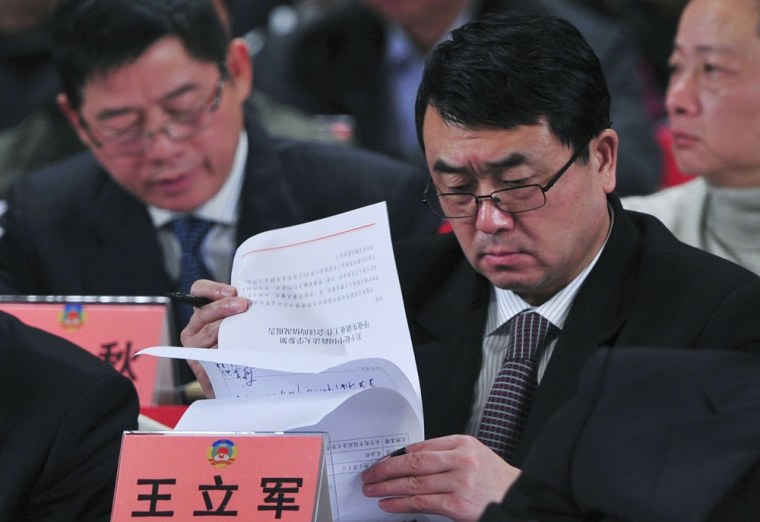A prominent Chinese official who might have been the country's most famous policeman has dropped from sight amid unconfirmed reports of a political scandal and a bid for U.S. asylum.
The Chongqing city government said Wednesday that Wang Lijun, its police chief until last week, had "reportedly" taken leave to recover from anxiety and physical ailments resulting from his heavy work load.
A brief government notice said Wang, who is also a vice mayor, was undergoing "vacation-style therapy," but gave no details.
A city government spokesman, who like many Chinese bureaucrats would only give his surname, Ye, confirmed the notice but did not elaborate.
Wang made his mark busting gangs, but Chongqing announced last week that he was being shifted from his police duties to deal with economic and other matters.
He has been the subject of days of speculation since then, including online reports that he sought asylum at the American consulate in Chengdu after a falling-out with the city's powerful Communist Party secretary, Bo Xilai.
Bo, who sits on the party's powerful 25-member Politburo, appointed Wang in 2008 to clean up the force and take on organized crime in a campaign that drew national attention, as well as criticism that it ignored proper legal procedures.
'No threat' to consulateOn Wednesday, many Chinese microblog users speculated that Wang had been purged. Some said Wang had sought asylum at the U.S. consulate in Chengdu in southwest Sichuan province, several hours' drive from Chongqing, prompting police to gather around the consulate.
The consulate referred questions to the U.S. Embassy in Beijing, where the spokesman Richard Buangan told Reuters he was "not in a position to comment regarding reported requests for asylum."
"I can tell you there was no threat to the (Chengdu) consulate yesterday, and the U.S. government did not request increased security around the compound," said Buangan.
Ye, the city government spokesman, said he could neither deny or confirm the reports of Wang's asylum bid.
"We saw that on the Internet too. I don't have relevant information now," Ye said.
In a sign of the sensitivity of the matter, search results for Wang and Bo were blocked on China's hugely popular Sina Weibo microblogging service and the comments sections attached to online reports about Wang were disabled.
Wang, a 52-year-old martial arts expert, entered law enforcement in 1984 and served more than two decades in northeast Liaoning province, where Bo was once governor.
He won a reputation for personal bravery in confronting gangs and was once the subject of a TV drama called "Iron-Blooded Police Spirits."
'Big blow'
His law enforcement success led eventually to high political office, and his association with Bo gave him countrywide name recognition.
A former commerce minister, Bo is considered a leading "princeling" in the party, a reference to the offspring of communist elders whose connections and degrees from top universities have won them entry into the country's elite.
Bo garnered huge publicity for his anti-crime campaign and an accompanying drive to revive communist songs and poems from the 1950s and 1960s.
Those campaigns have since fizzled, leading analysts to pull back on speculation that he might be promoted to higher office when the party begins a generational change in leadership later this year.
"This will be a big blow to Bo Xilai, because Wang was instrumental in his anti-organized crime campaign, and that was instrumental in building Bo's appeal in public opinion and even among officials," said Chen Ziming, an independent scholar who studies party politics.
"Now the hero of that campaign has turned into a scandal, so at the least that's a blow to Bo's public prestige," said Chen, a former political prisoner who lives in Beijing.
